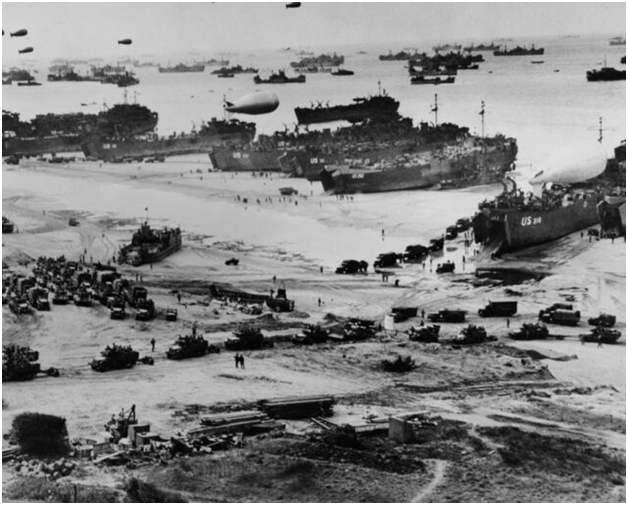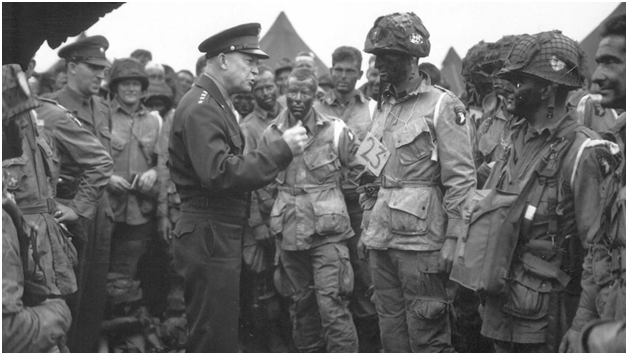Trust, Strength, and Bravery: Here’s what you can learn from the largest amphibious invasion in history! [Fridays: Mindfulness by Miles]

Miles Everson’s Business Builder Daily speaks to the heart of what great marketers, business leaders, and other professionals need to succeed in advertising, communications, managing their investments, career strategy, and more.
A Note from Miles Everson:
Hi, everyone!
Each Friday, I am sharing my insights and advice on a topic or event that I find useful in my everyday life. My hope is to use these experiences and personal interests to help you develop your skills, improve your character, and boost your career.
This week in particular, I’ll be talking about one of the biggest events in the history of World War II.
I’m referring to the Normandy Landings on June 6, 1944, which is also known as D-Day.
Keep reading to know my key takeaways from this historical event. I believe these insights will help you learn the values you need to thrive and succeed, especially when working with a team.
Miles Everson
CEO, MBO Partners
Chairman of the Advisory Board, The I Institute
Mindfulness by Miles
World War II was a global war that lasted from 1939 to 1945. It involved majority of the world’s countries forming two opposing military alliances: The Allies (UK, US, Soviet Union, and China) and the Axis Powers (Nazi Germany, Imperial Japan, and Fascist Italy).
During the war, major participants threw their entire economic, industrial, and scientific capabilities behind the war effort, blurring the distinction between civilian and military resources.
So far, World War II was the deadliest conflict in human history, resulting in over 85 million fatalities.
… and one of the battles that took place during this global war?
The Battle of Normandy or the Normandy Landings!

Photo from National Today
The Normandy Landings were the Allies’ associated operations on June 6, 1944.
Codenamed “Operation Neptune” and often referred to as “D-Day,” the Battle of Normandy was the largest seaborne invasion in history. The operation began the liberation of France and laid the foundations of the Allies’ victory on the Western Front.
[D-Day: In military terms, this refers to the day on which a combat attack or operation is to be initiated.]
Here’s a brief background of this event…
Plans for the sea battle began as early as 1943. In the months leading up to invasion, the Allies conducted a substantial military deception to mislead the Germans about the exact date and location of the Allies’ main landings.
Originally, D-Day was set on June 5, 1944 but the weather was far from ideal. So, the operation had to be delayed for 24 hours. At that time, US President Franklin D. Roosevelt placed Major General Dwight D. Eisenhower in command of the Allied Forces.

Photo from The Washington Post
The amphibious landings consisted of extensive aerial and naval bombardment, as well as airborne assault. Allied infantry and armored divisions began landing on the coast of France on June 6, 1944.
The target 80-kilometer stretch of the Normandy coast was divided into 5 sections: The Utah, Omaha, Juno, Gold, and Sword beaches. However, due to strong winds, the Allies’ landing crafts arrived east of their intended positions. As a result, the soldiers landed under heavy fire from gun emplacements overlooking the beaches.
The highest number of casualties was recorded in Omaha beach. Meanwhile, some fortified towns were freed from the Axis Powers’ control in Gold, Juno, and Sword beaches. Additionally, two major gun emplacements were disabled in Gold beach.
The Allies didn’t achieve their goal to fully invade the coast of Normandy on D-Day. However, the operation enabled them to gain a foothold that they gradually expanded in the coming months.
Today, several museums, memorials, and war cemeteries have been set up in the area. These places host thousands of visitors each year.
—
According to Miles Everson, CEO of MBO Partners, he decided to talk about D-Day due to the event’s 78th anniversary on Monday, June 6, 2022.
He says D-Day is not only the largest amphibious invasion in military history; it is also one of the biggest and most incredible demonstrations of the importance of teamwork.
For Everson, D-Day is a precedent of what a strong team should exhibit: Trust, strength, and bravery. He believes these values are not only meant for military teams but also for any team in any industry.
In fact, these are the same values he applies in leading various teams at MBO Partners! Here are his reasons why:
- Trust
During World War II, trust was at an all-time low. According to Everson, if you look back on the events leading up to D-Day, you’ll see thousands of cases of mistrust—people distrusting one another for their religion, political alliance, nationality, and sexual orientation, and many countries shifting alliances right and left.
That’s why for him, it was a miracle that the UK, US, Soviet Union, and China trusted one another to carry out D-Day. What’s more?
Because of trust, these nations also encouraged Australian, Belgian, Czech, Dutch, French, Greek, Norwegian, and Polish troops to join the Allies’ side and execute the operation.
Everson’s key takeaway:
By understanding the events that happened on D-Day, he learned that it’s important to properly lead a team of various individuals from all walks of life… and a key ingredient to that kind of leadership is trust.
He says as a leader, there is nothing more critical than having the members of his team trust one another. This is essential in accomplishing a certain goal.
- Strength
Everson says strength comes in many forms. It is not just about physicality, bruteness, or numbers but also about the amount of determination and resilience a team has.
Examine the events that unfolded during D-Day. Despite knowing that the Nazis already held a greater part of Europe, the Allies still gathered their strength and marched towards the 80-kilometer stretch of Normandy’s fiercely defended beaches.
Because of this, the Allies changed the course of the war and got a foothold in the area.
Everson’s key takeaway:
He learned that even if a team is against an immense force, it’s important that the members, especially the leaders, never underestimate one another.
He believes strength is contagious. If someone from the team is strong, that person will inspire his or her members to be strong also. This value is essential in helping the whole team move forward and achieve a particular goal.
- Bravery
For Everson, bravery is one of the most important lessons anyone can learn from D-Day. As mentioned in point #2, the Nazis already harnessed most of Europe’s greatest powers. Despite that, the Allies didn’t back down from facing one of the largest and strongest military forces in history.
They gathered together and found a common purpose to fight for. They mustered up courage and stormed the coast of Normandy to liberate France from the Axis Powers’ control.
Everson’s key takeaway:
It is one thing to be courageous when your side has the upper hand in a situation… but it is an entirely different thing to still be courageous when your side is on the losing end and chances of succeeding are slim.
Everson says if you’re a leader, it is important to show boldness and bravery because it will inspire your team to combat any fear rising in their bones.
He also believes it is necessary to encourage your team and unite them to accomplish a goal. He says if your team is thriving on courage, every member will be motivated to go the extra mile in doing a certain task or project.
Overall, Everson says D-Day is a day that people should keep in their hearts and minds. Why?
It wasn’t only a major turning point in World War II, but also an exemplary historical event that teaches people how teams should work together.
According to Everson, any team in any industry can become an unstoppable force through trust, strength, and bravery. He believes these values are important in all walks of life, whether in business, relationships, careers, etc.
May Everson’s insights on D-Day inspire you to properly and effectively manage a team (if you’re a leader) or genuinely coordinate and work with your group (if you’re a team member)!
By being trustworthy, strong, and brave, you’ll contribute to establishing a healthy work culture in your workplace.
Revisit this important day in history and apply what it teaches you about how to successfully lead or work with a team!
(This article is from The Business Builder Daily, a newsletter by The I Institute in collaboration with MBO Partners.)
About The Dynamic Marketing Communiqué’s
“Fridays: Mindfulness by Miles”
High-performance businesses are run by people who think and act differently.
In other words, these are people who are high-performing individuals.
Companies and individuals of this kind have found ways to escape the grind of commoditization and competition by focusing on the RIGHT goals.
High-performing businesses and individuals are also “return driven” businesses and “career driven” individuals. They conscientiously develop unique capabilities and resources that allow them to deliver offerings in ways no other firm or individual can.
Every Friday, we’ll publish tips and insights from MBO Partners and The I Institute’s “The Business Builder Daily” newsletter.
These will help you gain knowledge on the things that Miles Everson, the CEO of MBO Partners, often talks about regarding the future of the workforce.
We’ll also highlight other mindfulness advice on how you can be a high-performing individual both in your career and personal life.
Hope you’ve found this week’s insight interesting and helpful.
Stay tuned for next Friday’s “Mindfulness by Miles!”
Cheers,
Kyle Yu
Head of Marketing
Valens Dynamic Marketing Capabilities
Powered by Valens Research
www.valens-research.com




